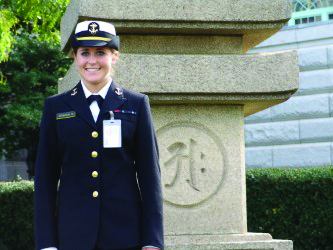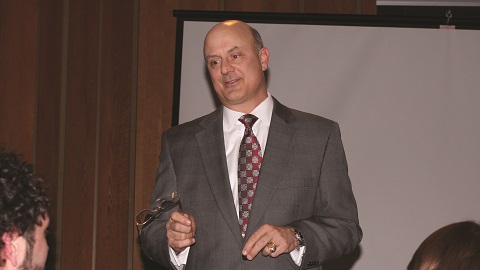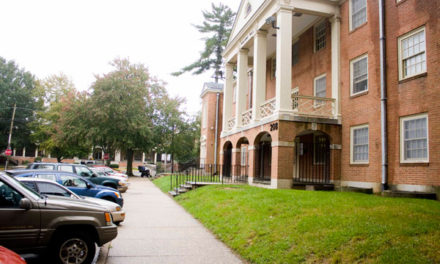
Annie Kendzior fears Clark will mishandle sexual assault cases at Wesley || Russel Kendzior
By Brittany Wilson and Kristen Griffith, The Whetstone
Two months into her freshman year at the United States Naval Academy in Annapolis, Md., Annie Kendzior says she was raped.
Four months after she spoke up and told her story, she was kicked out.
Nearly six years later, Kendzior is shocked that the same man who she says told her to “suck it up” and get out is in charge of Wesley College, President Robert Clark.
“My biggest fear is that something like this will happen to another woman and derail her the same way it derailed me,” Kendzior said.
Although Kendzior says she was raped on two separate occasions as a freshman in 2008, she did not report the incidents until 2011—the same year Clark became commandant at the Naval Academy. Clark chaired the hearing that sent Kendzior home before she could graduate.
Kendzior’s father, Russell Kendzior, said Wesley College students should be concerned that Clark may not take reports of sexual assault on campus seriously.
“Bob Clark has proven to mishandle cases of sexual assault in the past, so why do you think he’s going to be any different at your school,” he said. “Why would he view the women on your campus any differently?”
Clark said he will not discuss any cases he had direct or indirect involvement in prior to assuming the presidency of Wesley College.
“They have no relevancy on the present and/or Wesley College,” he said. “[At Wesley] we are committed to building and preserving a community in which members of our Wesley College family can work together, free from all forms of exploitation, intimidation and all forms of harassment.”
The president of the Black Student Union disagreed.
“If you want to make a prediction on someone’s behavior, common sense will tell you to look at his past,” senior Evan Le’Mon said. “Their past behaviors will be indicative of what they’ll do in the future. If how he handled that case at the Naval Academy is a precedent for how he’s going to handle cases here, I don’t think that bodes well for Wesley.”
Kendzior’s Navy career began in 2008, nearly three years before Clark became commandant of the Naval Academy, a position similar to dean of students.
In her first semester, she said she was raped after blacking out at a lacrosse house party.
“That was like two months into school, I’m a freshman, I get raped, and I can’t tell anyone because I knew I’d get separated,” she said.
A few months later, Kendzior said she was raped again, this time by two basketball players.
“I’m pretty sure drugs were involved that time—I blacked out after one drink,” she said. “So I was raped twice my freshman year and held it in for about two and half to three years.”
Kendzior said she kept both incidents a secret because she was afraid if she reported them she would get kicked out of the Academy.
English Department Professor and Chair Dr. Linda De Roche said our nation’s culture discourages accusations of sexual assault.
“I think that most men and women are reluctant to make accusations of sexual assault because they feel like nobody’s going to believe them,” she said. “Most cases are he said-she said – there’s no witness, there may not be any physical evidence. Victims know they probably won’t be believed, and so they don’t want to be humiliated by the process.”
De Roche said a recent example is how several women were recently criticized for accusing presidential candidate Donald Trump of sexual assault.
“People ask why the women didn’t make those accusations at the time, why did they wait until 10 years later,” she said. “But I understand why. You have to be a very strong person to come forward and accuse someone of sexual assault.”
Kendzior said because one of the men who raped her was in her company at the Academy, she had to see him every day. She said the first time she met with Clark, she asked him to let her change companies.
“My requests had been denied in previous years, so when I finally got the chance to meet with Clark, who was the new commandant at the time, I was hoping for a change,” she said.
Kendzior said she did not include any direct mention of her assaults when she approached Clark, but that she felt unsafe with the men she was working with.
“I told Clark I was not comfortable with the men who were there with me,” she said. “He didn’t ask for details, just basically told me to suck it up and quit complaining. He never once questioned why I might be feeling that way, just told me to deal with it.”
Kendzior said that was when things started spiraling out of control— her grades began to slip, she was severely depressed, had suicidal thoughts, and was diagnosed with Borderline Personality Disorder.
“[Leaving me in the company] was a total disregard of my mental, emotional, and physical well-being,” she said. “It just put me back into the same ring with the same guys over and over again— it was a living hell for me.”
Kendzior said a psychologist at the Academy told her she was going to be kicked out of school because she had been deemed mentally unfit to serve in the Navy.
Kendzior decided she had no choice but to report the two sexual assaults to her superiors.
Once she did, Kendzior said administration did not waste any time getting her out the door.
“I came out in March and they told me to resign,” she said. “I refused because I didn’t do anything wrong. I was raped. Then over the summer Bob Clark and the administration called for an academic hearing for me.”
Kendzior said at the hearing she confessed to a jury of ten to fifteen high ranking naval officers—including Clark—that her psychological distress had resulted from two incidents of sexual assault during her freshman year.
Kendzior said Clark asked her why she shouldn’t be expected to refund the academy for her education like other midshipmen who did not graduate.
“I told them I wanted to graduate,” she said. “I didn’t do anything wrong; I should not be penalized for being raped.”
Kendzior was “separated” from the Naval Academy that summer for “insufficient aptitude.”
Former Navy Captain Jack Reape, who graduated from the Naval Academy with Clark in 1984, said Clark did not take action the way he should have.
“Chapter Eight in Navy Regulations says the commanding officer is responsible for the moral, mental, and professional development of their subordinates,” he said. “When someone comes to you saying they’ve been sexually assaulted, you’re supposed to ask questions.”
Kendzior said she worries that Clark’s history might repeat itself at Wesley College.
“I’ve never seen Bob Clark display the leadership capabilities necessary to handle the things that happen between men and women,” she said. “He has spent his whole career, his whole life, leading primarily a bunch of guys.”
De Roche, who was a member of the Presidential Selection Committee that elected Clark as Wesley’s president, said the accusations were not withheld from committee members.
“It was a matter of hearsay, I really couldn’t say one way or another what happened,” she said. “We made our decision simply based on our interactions with [Clark] during his interviews.”
English Professor Susan Bobby said although she did not feel she could comment on Kendzior’s case, she has confidence in Clark’s ability to handle similar situations at Wesley.
“From the moment he got here, he’s been very upfront and transparent—I don’t get the sense that he’s deceptive or anything like that,” she said. “He communicates frequently how much he cares about faculty, students and staff. We’ve never had a president like that.”
Wesley College’s 2015 Annual Safety and Security Report only shows four reports of sexual assault from 2012-2014. However, Title IX Educator Renee McGlothlin said it’s common for sexual assaults to go unreported – up to 90 percent.
“Approximately 1 in 5 women and 1 in 16 men are sexually assaulted while in college,” she said. “We also know that August through November more than 50 percent of sexual assaults are committed to freshmen and sophomores.”
De Roche said she is certain that there are more cases of sexual assault on campus than the reported four.
“I would venture to say that most women have experienced a sexual assault of some sort,” she said. “Not always rape, but certainly offensive touching or a date who’s gone too far. How many of those go unreported? It’s so common that you just accept it.”
Freshman Hadizah Tukpei said if she was involved in a sexual assault case, she is not confident that Wesley would handle it properly.
“I didn’t know Wesley was going to be like this,” she said. “The area is unsafe. We talked about Title IX maybe once, maybe twice. I think it needs to be talked about more so everyone can feel safe on campus.”

President Clark said Kendzior’s case is not relevant to Wesley || Kristen Griffith / The Whetstone
The 2015 Wesley College’s Annual Campus Security Report classified incidents similar to Kendzior’s as punishable sexual misconduct— “grounds for administrative disciplinary action, including immediate administrative withdrawal and expulsion of student.”
Once the victim of a sexual assault case files a report, an investigation is conducted and the suspect’s consequences are determined according to the evidence presented.
The U.S. Department of Education’s Office of Civil Rights (OCR) implements and enforces Title IX procedures, which disallow gender discrimination in educational programs and activities run by recipients of Federal financial assistance.
Kevin Johnson, a senior, said though Wesley has hosted a number of Title IX events, attendance is low.
“Renee [McGlothlin] does a good job with making events to raise awareness,” he said. “But it depends on the people here if they go to it or not. When Wesley puts on Title IX events, you get fliers and emails but that’s about it. You don’t have anyone running around advocating for stuff like that.”
Dr. Anthony Armstrong, professor of political science, said Title IX is necessary in part because of the way women are objectified, insulted and treated within our nation’s culture.
“Title IX has become increasingly important and its emphasis has changed over time,” he said. “It has changed, of course, because of all the reports of sexual assault on campuses.”
McGlothlin said at Wesley College all sexual assault cases are handled according to a specific process.
When a student reports an assault to a Wesley employee, the employee must report it to security or Title IX Coordinator, Dean Wanda Anderson, who then investigates the accusation.
“Based on the investigation, a decision is made to move forward with a mediation, hearing or dismissal of allegations,” McGlothlin said.
Wesley is required to conduct an investigation even if the assault took place off campus.
The OCR said Title IX does not apply to “educational institution(s) whose primary purpose is the training of individuals for a military service of the United States or for the merchant marine.”
Unlike Wesley students, Kendzior was not protected by Title IX, but by the Department of Defense’s (DoD) Sexual Assault Prevention and Response (SAPR) policies instead.
According to SAPR guidelines “[DoD will] focus on the victim and on doing what is necessary and appropriate to support victim recovery, and also, if a Service member, to support that Service member to be fully mission capable and engaged. The SAPR Program shall provide care that is gender-responsive, culturally-competent, and recovery-oriented.”
U.S. Naval Academy (USNA) guidelines state sexual assault will not be tolerated.
“The policy is clear: zero tolerance,” it states. “Should a sexual assault occur, comprehensive assistance to the victim(s), prompt and thorough investigation and assessment, and mandatory action against the alleged offender(s) are required. Victims receive sensitive care and support and are not re-victimized as a result of reporting the incident.”
Reape said he was disappointed in Clark’s professionalism in the handling of Kendzior’s case.
“I question the decision he made, the process he used, and I question his leadership,” he said. “When Bob didn’t stand up for Annie Kendzior, he let the Naval Academy down.”
Professor and Chair of the Philosophy and Religion Department Dr. Jeffrey Mask said he had done a quick Google search on Clark prior to his presidency and found several articles about Kendzior’s case.
“In that role [Commandant] Clark had to make some judgements,” he said. “I think the Naval Academy is a very different institution. The culture, the whole idea of honor and duty and rules applies there in ways that we as non-military people wouldn’t become familiar with.”
Russell Kendzior said he wants to use his daughter’s experience to help other women.
“My daughter left the academy, she is doing very well,” he said. “But what about the thousands of other women who are going through the same thing my daughter went through who aren’t doing so well? The ones who are going through all kinds of troubles in their lives because they just haven’t been able to talk about it because it’s a ‘shameful’ thing? Those are the women that I want to protect at Wesley College.”
McGlothlin said students can avoid sexually threatening situations by being a good bystander.
“If something looks wrong, it probably is,” she said. “Speak up or call security and report what you see. The key is to report the incident and decide later to move forward with police assistance or within the college judicial process. All information will remain private.”



